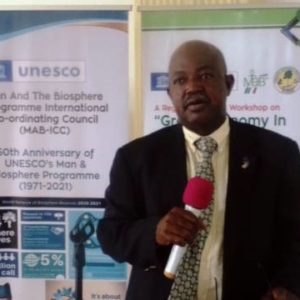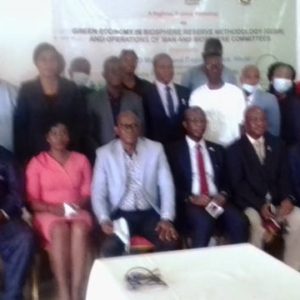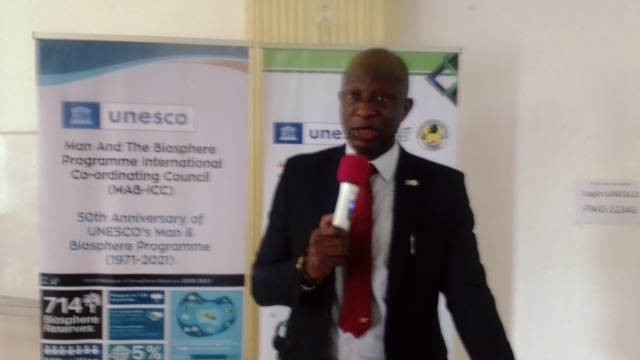PHOTO: Prof. Adeshola OlatundeAdepolu
By Augustine Octavius, augustineoctavius@gmail.com
Unsustainable land-use practices, over exploitation and ineffective management of protested areas are posing serious threat to the maintenance of Liberia’s ecosystem and its habitat, the Chairman of the International Coordinating Council of man ant the Biosphere has said.
Professor Adeshola OlatundeAdepolu, who is also Director General of the Forestry Research Institute of Nigeria, said most of the ecosystems have been critically degraded with negative impacts on biological diversity and people’s livelihood.
Prof. Adepolu made the observation at the opening of a four-day regional training workshop on green economy in biosphere reserve methodology and operations of Man and the Biosphere in Monrovia.
According to him, the global human population is currently at 7. 8 billion and predictably, this is expected to reach 8.6 by 2030 and 9.8 by 2050.
“The exponential increase in population and urbanization will have implication on the limited finite natural resources,” he said.
“The concept of green economy in biosphere reserve is therefore predicated on providing alternative livelihood options, income generating and biodiversity friendly activities for women and youth in particular. It is people-centered solutions towards a more sustainable development whilst highlighting the crucial role people play as both instruments and beneficiaries in the conversation of the biosphere reserve,” said the Director General of Nigeria Forestry Institute.
Delivering the keynote speech, the Chief Technical Advisor at the Environmental Protection Agency, Benjamin armoh who represented the Executive Director of the EPA, Professor Wilson Tarpeh, said the biosphere is a critical ecosystem that as a reservoir or in habitat for natural resources including plant and animal species.

Mr. Benjamin Karmoh, EPA
According to him, the representation of the various agencies and ministries at the training is an indication of the seriousness that the Liberian government attaches to the preservation and conservation of the biosphere.
“We recognized the important role of the United Nations Educational, Scientific and Cultural Organization is playing on the preservation conservation of the ecosystem,” he said.
He adding: “In Liberia we have the largest portion of the Mount Nimba natural reserve, which is found in the northern part of Liberia bordering Guinea and Ivory Coast.”
The EPA official noted that in 2003, Liberia was able to ensure that the nature reserve in Mount Nimba gain protected status in order to come in pile with the protected areas in Guinea and Ivory Coast
“We need to move the work ahead in terms of protecting the reserve for the future generations so as they cannot hold the present ones responsible for depleting the resources,” Mr. Karmoh asserted.

The regional training workshop, which brought together about 40 participants from Guinea, Sierra Leone and host country, Liberia, was organized by the Forestry Research Institute of Nigeria with funding from the United Nations Educational, Scientific and Cultural Organization based in Abuja , Nigeria.

